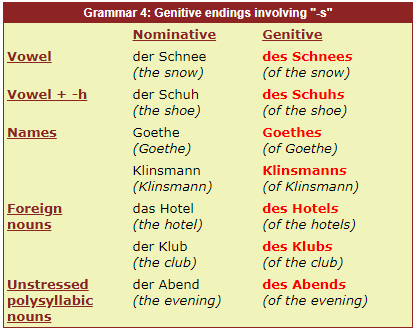with nouns ending in a vowel
(but not adjectival nouns and weak masculine nouns)
with nouns ending in a vowel + "-h"
with proper names
with foreign names that do not end in "-s", "-x" or "-z"
with nouns of more than one syllable ("polysyllabic nouns") wher the stress is not on the final syllable

Other nouns
There are no clearcut rules for the large number of nouns that do not fall into the groupings listed above. The choice between "-s" and "-es" is governed by such unclassifiable factors as style, rhythm and ease of pronunciation. It is thus highly likely that you will find both endings used for certain masculine and neuter nouns when they are in the genitive case.
As a very rough guideline, "-es" is more likely to be found:
in monosyllabic words
in words wher the stress falls on the final syllable
in words ending with two consonants
in formal written German
Using the dictionary
As the choice of genitive endings for masculine and neuter nouns can prove difficult for beginners, try looking up the correct ending in a dictionary. A good English-German dictionary will normally list the genitive ending after the gender and before the nominative plural ending for a noun. For example:
der Biss m "-es" -e
(m = masculine) (genitive = des Bisses) (plural = Bisse)
das Mädchen nt "-s" -
(nt = neuter) (genitive = des Mädchens) (plural = Mädchen)
das Kind nt "-(e)s" -er
(n = neuter) (genitive = des Kinds or des Kindes) (plural = Kinder)





